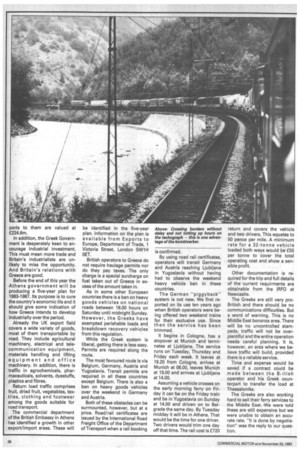ports to them are valued at £224.6m.
Page 28

If you've noticed an error in this article please click here to report it so we can fix it.
In addition, the Greek Government is desperately keen to encourage industrial investment. This must mean more trade and Britain's industrialists are unlikely to miss the opportunity. And Britain's relations with Greece are good.
Before the end of this year the Athens government will be producing a five-year plan for 1983-1987. Its purpose is to cure the country's economic ills and it should give some indication of how Greece intends to develop industrially over the period.
Already the UK export field covers a wide variety of goods, most of them transportable by road. They include agricultural machinery, electrical and telecommunication equipment, materials handling and lifting equipment and office machinery. In addition, there is traffic in agrochemicals, pharmaceuticals, solvents, dyestuffs, plastics and fibres.
Return load traffic comprises fruit, dried fruit, vegetables, textiles, clothing and footwear among the goods suitable for road transport.
The commercial department of the British Embassy in Athens has identified a growth in other export/import areas. These will be identified in the five-year plan. Information on the plan is available from Exports to Europe, Department of Trade, 1 Victoria Street, London SW1H OET.
British operators to Greece do not require haulage permits nor do they pay taxes. The only charge is a special surcharge on fuel taken out of Greece in excess of the amount taken in.
As in some other European countries there is a ban on heavy goods vehicles on national roads between 18.00 hours on Saturday until midnight Sunday. However, the Greeks have exempted perishable loads and breakdown recovery vehicles from this regulation.
While the Greek system is liberal, getting there is less easy. Permits are required along the route.
The most favoured route is via Belgium, Germany, Austria and Yugoslavia. Transit permits are required in all these countries except Belgium. There is also a ban on heavy goods vehicles over the weekend in Germany and Austria.
Both of these obstacles can be surmounted, however, but at a price. Road/rail certificates are issued by the International Road Freight Office of the Department of Transport when a rail booking is confirmed.
By using road rail certificates, operators will transit Germany and Austria reaching Ljubljana in Yugoslavia without having had to observe the weekend heavy vehicle ban in these countries.
The German "piggyback" system is not new. We first reported on its use ten years ago when British operators were being offered two weekend trains for their exclusive use. Since then the service has been trimmed.
It begins in Cologne, has a stopover at Munich and terminates at Ljubljana. The service runs on Tuesday, Thursday and Friday each week, It leaves at 19.20 from Cologne, arrives at Munich at 06.00, leaves Munich at 19.00 and arrives at Ljubljana at 14.00.
Assuming a vehicle crosses on the early morning ferry on Friday it can be on the Friday train and be in Yugoslavia on Sunday at 14.00 and driven on to Belgrade the same day. By Tuesday midday it will be in Athens. That would be the time for one driver. Two drivers would trim one day off that time. The rail cost is £720 return and covers the vehicle and two drivers. This equates to 50 pence per mile. A minimum rate for a 32-tonne vehicle loaded both ways would be £55 per tonne to cover the total operating cost and show a sensible profit.
Other documentation is required for the trip and full details of the current requirments are obtainable from the IRFO at Newcastle.
The Greeks are still very proBritish and there should be no communications difficulties. But a word of warning. This is no Middle East bonanza area. There will be no uncontrolled stampede, traffic will not be overplentiful and the entire operation needs careful planning. It is, however, an area where we believe traffic will build, provided there is a reliable service.
Time and expense would be saved if a contract could be made between the B;itish operator and his Greek counterpart to transfer the load at Thessalonika.
The Greeks are also working hard to sell their ferry services to the Middle East. We were told these are still expensive but we were unable to obtain an accurate rate. "It is done by negotiation" was the reply to our question.












































